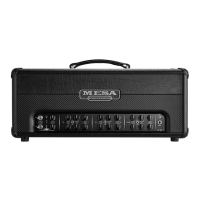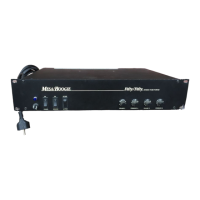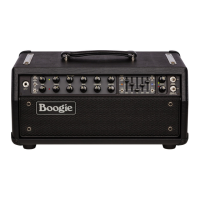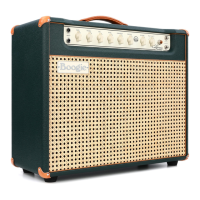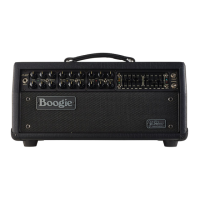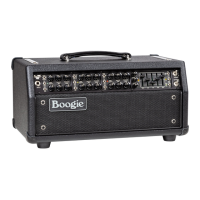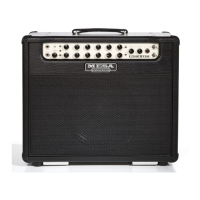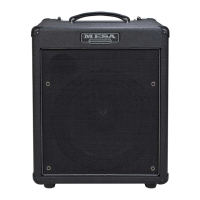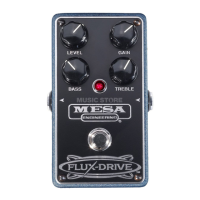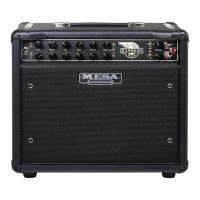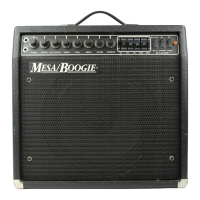Do you have a question about the Mesa/Boogie TriAxis and is the answer not in the manual?
Instructions for powering on the TriAxis unit using the rear AC power switch.
Guide on how to cycle through and use factory presets 1 through 10.
Using arrowed keys to adjust presets, programs, or parameters on the front panel.
Procedure for saving new parameter settings into existing presets, including confirmation.
How to sequence and store combinations of FX Loop and Function Switches.
Steps to access programs using the SHIFT key and numeric keypad.
Steps to access presets using the SHIFT key and numeric keypad.
Guide on assigning a preset sound to a specific program location.
Detailed steps for copying one preset to another location.
How to cycle through and select the eight available modes.
Explanation of the information displayed in the Program/Channel window.
Procedure to change the MIDI channel number using the PGM/CH key and arrow keys.
Information on dumping preset/program combinations and settings to external storage.
Steps to transmit and receive data to/from storage media.
How to disable the automatic factory preset power-up command.
How to recall the factory presets into memory locations 1-20.
How the coax power jack provides power to a MIDI foot controller via the 7-pin MIDI jack.
Explanation of the MIDI IN, THRU, and OUT jacks and their functions.
How switch jacks are used for controlling external devices and features.
Description of stereo jacks for interfacing with recording consoles.
Description of stereo output jacks for interfacing with amplifiers or effects.
Explanation of the mono send and stereo return FX loop configuration.
Location and purpose of the instrument input jack.
Description of the Gain control's function, impact on tone, and recommended settings.
Explanation of the Treble control's role in blending tone and its interaction with other controls.
Description of the Midrange control's impact on punch, blend, and its unique behavior in Lead 1 Red mode.
Explanation of the Bass control's interaction with Treble and its recommended settings for different modes.
Details on the Lead 1 Drive control, its role in overdrive, and suggested usage with Gain.
Explanation of the Lead 2 Drive control, its taper, and its interaction with the Gain control.
Explanation of the Master control's three purposes: level balancing, effects send, and recording output.
How the Presence control regulates brightness and negative feedback dynamically.
Description of the Dynamic Voice circuit, its EQ function, and blending capabilities.
Explanation of the final Output control for overall volume and effects return level.
Introduction to the Rhythm modes, their grouping, and their characteristics.
Detailed description of the Rhythm Green mode, its vintage tone, and applications.
Description of the Rhythm Yellow mode, its tighter attack, and comparison to Rhythm Green.
Introduction to the three Lead 1 modes and their characteristics.
Description of the Lead 1 Green mode, its vintage tone, and usage.
Description of the Lead 1 Yellow mode, its darker, warmer, and smoother tone.
Description of the aggressive Lead 1 Red mode, its tight character, and mid-forward voicing.
Introduction to the three Lead 2 modes and their characteristics.
Description of the Lead 2 Green mode, its focused gain, and thick character.
Description of the Lead 2 Yellow mode, its "California" sound, and connection to Mark II-C+.
Description of the Lead 2 Red mode for shredding, its aggressive top end, and loose highs.
Definition of a Base Preset as a starting point for control change assignments.
List of front panel controls that can be modulated by expression pedals.
Explanation of how increasing or decreasing a pedal value changes parameters.
Explanation of MIDI channels and assigning controllers to TriAxis parameters.
How to set positive or negative values for parameter modulation.
Explanation of sub-routines like Controller/Assign and Value for programming.
Step-by-step guide to assign controllers to parameters.
Key rules and guidelines for assigning modulation values to parameters.
Steps to enter the Value Sub-Routine to set modulation amounts.
Details on the function of each tube (V1-V5) in the TriAxis.
Physical dimensions of the TriAxis unit.
Key technical specifications including weight, impedance, and power.
Diagram showing a basic hook-up of the TriAxis with a power amp.
Diagram showing hook-up with FX unit and MIDI connections.
Diagram showing stereo FX in the pre-power chain.
Diagram showing compressor in the programmable loop.
Diagram showing volume pedal with FX unit for tonal character.
Diagram showing TriAxis in line with a recorder and mixing console.
Diagram showing parameter modulation via pocket pedal and volume pedal.
Diagram showing FX loop bypass for pedal FX.
Settings for Factory Preset 01, a classic British lead sound.
Settings for Factory Preset 02, a Mk II - C high gain lead sound.
Settings for Factory Preset 03, a high gain fat Mk I lead sound.
Settings for Factory Preset 04, a sweet-warm vintage Mk I clean sound.
Settings for Factory Preset 05, a tight-bright Mk IV clean sound.
Settings for Factory Preset 06, a vintage amp cranked sound.
Settings for Factory Preset 07, a bluesy Mk 1 lead sound.
Settings for Factory Preset 08, a howling blues Mk IV lead sound.
Settings for Factory Preset 09, a crazy Mk II - C crunch sound.
Settings for Factory Preset 10, a searing Mk IV crunch sound.
Template for recording personal settings for Set 1.
Template for recording personal settings for Set 2.
Template for recording personal settings for Set 3.
Template for recording personal settings for Set 4.
Template for recording personal settings for Set 5.
| Type | Tube Preamp |
|---|---|
| MIDI Control | Yes |
| Tubes | 5 x 12AX7 |
| Inputs | 1 x Instrument |
| Effects Loop | Yes |
| Footswitchable | Yes |
| Outputs | 2 x 1/4" (Main), 1 x 1/4" (Recording) |
